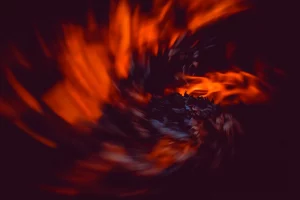One of the most common problems that people with a chimney have to deal with is a blocked flue. The reasons for the blockage can be many, but the most important thing is to know how to identify when a chimney is really blocked and what to do about it.
A blocked chimney can be dangerous for the people living in the house, as the smoke is not dispersed properly and can cause carbon monoxide poisoning. Therefore, it is important to know how to detect a blocked chimney to prevent any incidents.
How do you know if a chimney is blocked?
There are several signs that indicate a blocked chimney, such as, for example, a deviation in the normal direction of the flame (upwards), flames shooting from the top of the chimney, an excessive smell of smoke or a white residue on the chimney walls. If you notice these signs, it is important to inspect the chimney to detect and repair any blockages.
Signs of a blocked chimney
The following are some signs that a chimney is blocked:
The flame is not pointing upwards
This is a very clear sign that the chimney is blocked. If the flame does not point upwards, it means that the smoke cannot escape normally and is trapped inside the chimney. This can be dangerous, as smoke can build up inside and produce carbon monoxide.
Flames bursting from the top of the chimney
If flames are coming from the top of the chimney, it means that there is some kind of obstruction inside the chimney that is preventing the smoke from escaping properly.
Excessive smoke smell
If there is an excessive smell of smoke in the house, it usually means that there is some kind of blockage in the chimney. This may be due to the presence of some residue or burnt debris trapped inside the pipe, which prevents the smoke from coming out normally.
A white residue appears on the chimney walls.
White residue on the chimney walls indicates the presence of soot and is usually a clear sign that there is some kind of blockage inside. Soot is a combustible material and can cause fires if not properly cleaned.
Debris is falling towards the base of the chimney.
If there is debris falling towards the base of the chimney, it means that there is some kind of material trapped inside the flue and it is preventing the smoke from escaping properly. This debris can also cause fires if not removed.
Reasons why the chimney may be clogged
There are several reasons why a chimney may be blocked, such as:
Soot
Soot is a combustible material that builds up inside the flue as wood burns. If not cleaned properly, soot builds up and blocks the flues, preventing smoke from escaping.

Poorly constructed or assembled pipes
Poorly assembled or constructed flues can also cause problems with the airflow inside the chimney and cause blockage over time.
External objects
Sometimes external objects such as fallen branches or dry leaves enter the flue and cause blockage, preventing smoke from escaping properly. Blockage can also be caused by other objects such as bags and other items that can be blown in by gusts of air.
Bird nests
Bird nests are also a common phenomenon causing blockages in chimneys, as they are often large enough to prevent smoke from passing out of the chimney.
What to do if my chimney is blocked?
If you detect signs that your chimney is blocked, the first thing to do is to extinguish the fire to prevent possible fires or dangerous carbon monoxide leaks inside the home. The next thing you need to do is contact a qualified professional to properly clean the chimney and remove any blocking material present inside the pipe to ensure its optimal functioning.
Conclusion
It is important to be aware of the tell-tale signs of a blocked chimney, as they can be dangerous for your family. If they are not detected in time and the necessary measures are not taken to clean them properly, they can generate, in addition to unpleasant odours, incidents related to the escape of carbon monoxide inside the home, which endangers health.
For this reason, it is advisable not to have to reach this point. Before any doubt about your chimney, contact chimney cleaning professionals, such as Tu Deshollinador.
Tu Deshollinador works in the Region of Murcia and Alicante. Contact us for a no obligation quote.




